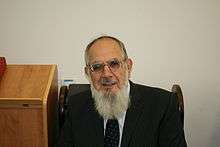Nahum Rabinovitch

Rabbi Nahum Eliezer Rabinovitch (Hebrew: נחום אליעזר רבינוביץ'; born 1928) is an Israeli Orthodox rabbi and posek, and head of Yeshivat Birkat Moshe in Ma'ale Adumim. He was born in Montreal, Canada. His late daughter was Dina Rabinovitch (1963–2007).
Studies
Rabinovitch began studying with rabbi Pinchas Hirschsprung at age 14. At age 20, he studied in Yeshivas Ner Israel, Baltimore, where he received Semicha from Rabbi Yaakov Yitzchok Ruderman. He also obtained a master's degree in mathematics from Johns Hopkins University. He later completed a Ph.D. in Philosophy of Science at the University of Toronto.
In 1951, Rabinovitch married Rachel Malka Shuchatowitz, the niece of rabbi Yaakov Yitzchok Ruderman.
Public life
Rabinovitch taught Judaism in several places and served as a congregational rabbi: Between 1952 -1963 he was the Rabbi of the Jewish Community in Charleston, South Carolina. In 1963 he was called to serve as a community Rabbi in Toronto. In the 1970s, he completed a Ph.D. in the field of statistics and probability in the Talmud at the university of Toronto; the results are in his book which is highly cited: "Probability and Statistical Inference in ancient and medieval Jewish Literature" (Toronto, 1973). At that time he also gave lectures at the University and was an editor of the Rabbinical Council of America's journal "Hadarom".
Rabinovitch also lived in London (1971–1982), where he served as dean of Jews' College and had a reputation as an influential scholar. He later agreed to be a head of Yeshivat Birkat Moshe in Ma'ale Adumim, West Bank, a Hesder institution.
Philosophy and major works
Rabinovitch is an authority on Maimonides; he has published scientific, theological, and halachic books and essays on Maimonides' writings. His philosophical approach is influenced by Maimonides' rationalism. It emphasizes the connection between philosophy and halacha, between Torah and scientific studies, and between theoretical learning and practical application in life.
In a recent interview (in Hebrew), Rabinovitch said that he backed religious studies for women, and did not see a problem in Halachic decisions taken by women. Jewish law has always spoken of monarchy as an ideal, but Rabinovitch said that it might not be dictatorial, and drew a picture of constitutional society, where the law is above everything else.
In 1995, he defended a decision calling on soldiers to refuse orders for vacate army bases in the Israeli-occupied territories, saying that is a classic democratic call for conscientious objection.[1]
In 1995, before Yitzhak Rabin's assassination, he had given an interview to Israeli radio, saying that Rabin was a moser – a deliverer of Jew to their enemies; however, he said resistance should be non-violent.[2]
On January 21, 2008, Rabbi Dov Lior of Hebron, Rabbi Ya'acov Shapira of Jerusalem's Mercaz HaRav Kook yeshiva, Rabbi Elyakim Levanon of Elon Moreh, and Rabinovitch met at Beit HaShalom to declare the government's policies on Israeli settlements to be "worse than the British Mandate's White Paper".[3]
Works
Hebrew
- Yad Peshuta (יד פשוטה) Commentary on Maimonides' halachic book "Mishne Torah" - 14 volumes.
- Melumdei Milchama (מלומדי מלחמה) - Responsa on halachic questions about military service
- Darkah shel Torah (דרכה של תורה) - halakhic-philosophical actual essays
- Hadar Itamar (הדר איתמר) - Finis on the Talmud
- Iyunim be-Mishnato shel ha-Rambam (עיונים במשנתו של הרמב"ם)
- Siach Nachum (שיח נחום) - Responsa on halachic questions
English
- Rabbi Hasdai Crescas (1340–1410) on Numerical Infinities - Isis, Vol. 61, No. 2 (Summer, 1970), pp. 224–230
- Studies in the History of Probability and Statistics. XXII: Probability in the Talmud - Biometrika, Vol. 56, No. 2 (Aug., 1969), pp. 437–441
- Torah and Science: Conflict or Complement - Challenge: Torah Views on Science and its Problems, Feldheim Publishers pp. 44
- Torah and the Spirit of Free Enquiry - Challenge: Torah Views on Science and its Problems, Feldheim Publishers pp. 54
- The one and the many: Early stochastic reasoning in philosophy - Annals of Science, Volume 34, Issue 4 July 1977, pp. 331 – 344
- Early antecedents of error theory - Archive for History of Exact Sciences, Volume 13, Number 4 / December, 1974 pp. 348–358
- Halachah and Technology - Proceedings of the Associations of Orthodox Jewish Scientists 2 (1969) pp. 129–149
- All Jews Are Responsible for One Another - Jewish Tradition and the Nontraditional Jew. Ed. Jacob J. Schacter. Northvale, NJ.: Aronson, 1992 pp. 177–204
- Probability and statistical inference in ancient and medieval Jewish literature - University of Toronto Press, 1973
- Rabbi Levi ben Gershom and the origins of mathematical induction - Archive for History of Exact Sciences, num.6, pp. 237–248, 1970
- The Way of Torah- The Edah Journal Vol 3 Issue 1
- What is “Emunat Ḥakhamim”?- Hakirah: The Flatbush Journal of Jewish Law and Thought Vol 5
References
- ↑ "Yeshiva head defends rabbis' ruling on disobedience in army" Jerusalem Post, Jul 18, 1995
- ↑ id=2840AAAAIBAJ&sjid=OSEGAAAAIBAJ&pg=7039,1823216&dq=nahum-rabinovich&hl=en Lodi News-Sentinel November 15, 1995
- ↑ Rightist rabbis brand gov't policy on settlements worse than White Paper Jerusalem Post